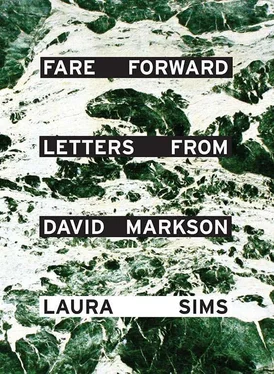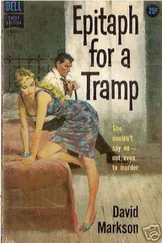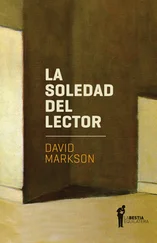Never mind what we talked about at the bar. And forgive me for letting him have his way about getting home the way he damn well pleased. Until a couple of days before his reading, I’d had laryngitis. I was going crazy, thinking I’d let him down. At the last minute my voice did come back, and I flew from Virginia to New York and read what I’d written. I think that was the last time I saw him. When David died, I got an e-mail from the director of the Y, who put my intro, and David’s reading, up on the site. Sad as it made me, I was transfixed, watching him read, hearing him. Wow: this was David Markson! You put those things out of your mind when you’re someone’s friend. It isn’t willed, you do it automatically. It’s clear he did the same with Vonnegut, with Barthelme, with William Gaddis, Harry Mathews, Gilbert Sorrentino. As everyone knows, writers don’t talk about what they’re writing, and they don’t bring up what they’ve written, either. It’s writerly etiquette, writerly superstition, and it’s also a way to insist on distance between your writing and who you are. But now that I’m older, I see that those two things aren’t necessarily so distinct. You always get to be more than the sum of your literary parts, simply because life is complicated and literature is more or less in your control. Other writers understand this, but non-writers don’t, which causes writers to skulk around and to avoid cocktail parties (oh yes, this does happen) and to befriend their dry cleaner and maybe, if they’re rich, their florist, and of course no different than any non-writer, they love their cats and dogs and miniature ponies, who operate primarily by non-verbal information. No pony ever thought: This is the author of Wittgenstein’s Mistress.
So I wish he’d had a pony. Or that when he avoided cocktail parties, at least he’d bought better wine for himself. (I suppose he was so perversely proud of not caring what wine tasted like that I shouldn’t wish things to be otherwise. Someone he was seeing expressed dismay at his wine choice, so he bought better wine — at least, for her.) He was happy if he ran into a writer friend in the Village when he was out for a walk, maybe on his way to the Strand, which was a place he loved (the feeling was mutual: there was a small table, a sort of David Markson altar, with a review of his book above it and a big pile on the table top.) He was even happier, though, if a tourist asked for directions and he could fill them in, not only about how to get to their destination, but about some of the times he’d enjoyed at the tavern they were looking for “years ago.”
Though David was polite to tourists, he thought hard about who was really going to become a friend. But he walked — he was Mr. Palomar, with the personal philosophy of Bartleby the Scrivener — and he noticed that all his friends were getting older. The discussions were about health when they stopped to talk. He could complain with the best of them. Some thought he was a hypochondriac. Some of his doctors he liked a lot, some of them he didn’t. The doctors and lost tourists — those were the people he’d see, interspersed sometimes with an old friend (Vonnegut was particularly loyal), or he’d have a much anticipated lunch with his son and daughter and his grandchildren. Marvin Paige, who ran Claire’s restaurant, was a friend. Burt Britton, formerly at the Strand, then at Books & Co. on Madison. Marvin made up his name. So did Burt. They were whoever they were, but to David they were the fictions Marvin Paige and Burt Britton. So it goes in NYC.
The ageing but not financially successful writer who lives in New York City is probably about as rare as Pale Male, the famous hawk who made national news when he built the nest above a swanky uptown apartment building and people were devoted to the sanctity of the birds’ rights to nest and to breed and to be left undisturbed. Pale Male was treated a lot more reverently than David Markson — though I’m sure David never aspired to live uptown. (David’s own plumage was quite lovely. He favored a black jacket, left unzipped, with a purple lining that really looked startlingly good on him). Like the bird, he just wanted his little place. I was at his small apartment only once, I think. What I remember most is that he’d had many bookcases built, and his books were all neatly arranged, minus their jackets. It was to prevent damage to their jackets, I think. Where did he put them, though? I can’t believe I never asked.
In the early eighties, I lived in the attic of a brownstone on West 20 thStreet, before Chelsea became fashionable. That was uptown to David. He gave me the manuscript of Wittgenstein’s Mistress when he finished it. As any writer will tell you, you just pray that you’ll like what another writer hands you. I admit that on rare occasions I’ve told lies so white, they’ve been their own little snowstorm — but more often than not, phrased as gently as possible, a writer will tell another writer what he/she thinks. But there was the difference in our ages, I was more often published than he, I’d never read his highly respected book about Malcolm Lowry (and still haven’t), I thought some of his books were interesting, others not to my taste. So I welcomed his manuscript, but I was uneasy about beginning to read. When I did, I knew right away, because of the voice, because of how radical, yet simultaneously understated the book was in every way, that it was brilliant. I think it might have taken me a day and a half, but when I called him, I was so filled with admiration that I could barely speak. It’s still the most powerful ending of a novel I’ve ever read, period. Those final words sometimes come to me at the oddest times, driving along, even when I’m on autopilot, grocery shopping. That it was not immediately embraced and celebrated, that he did not become the most valued writer, instantly. . well, I knew all the stories about Melville blah blah blah, and about Fitzgerald dying without knowing Gatsby was a classic, but David’s book was so overwhelmingly great that I was stunned it got rejected even once, let alone the many, many times it was turned down (I do believe some people were devastated that for one reason or another, they had to say no). What that told me was nothing about the book, but that the so-called literary establishment could not be trusted. I would have tried to sound blasé and say that of course I never trusted it, but until David’s experience with that book, I had believed, and then Tinkerbell — a lot of Tinkerbells — scattered stardust that stung, that was like sand kicked in your eyes, that truly hurt.
What do you say to someone who’s written an original, brilliant book that no one will publish? He was darkly humorous enough about the situation for both of us. We kept waiting for the one Yes . He was so generous, telling me how much my opinion mattered, and continued to matter. Sometimes I read the rejection letters, or other times he’d read a particularly depressing passage from one to me, over the phone. Something had stepped in between us. Of course neither of us had the power to change anything, but the thing was always there. Finally — after way too long — it did get published, and among serious readers, and among writers (who are always serious readers), it’s become one of the few texts that, when you say the title, instantly tells other people where you stand. I don’t follow the “conversation” on websites and blogs, and I didn’t even manage to go to the AWP panel discussion a few years ago. I’m intimidated from both sides: the erudite discussion of David’s work that’s way beyond me; the memory of who we used to be.
He wasn’t kidding when he said he could hardly read fiction at all, after a certain point. I put him in a story once. I didn’t tell him, but I gave him the book. The character was named “Markson” and if he’d seen it, he would certainly have called, or sent me one of his famous, funny postcards. The character wasn’t really meant to be him, though the story took place in New York, and the character was at a party to which he or anyone else we knew might have gone. It was a little secret hello from me to him, that’s all. He did the same with a line written just for me in one of his books. So I gave the secret wink and he didn’t see it, and he gave the secret wink and I smiled. I bring this up because whether overtly or covertly, whether unconsciously, or even as a prank, writers write to other writers. Just because they’ve died, those writers don’t disappear.
Читать дальше












